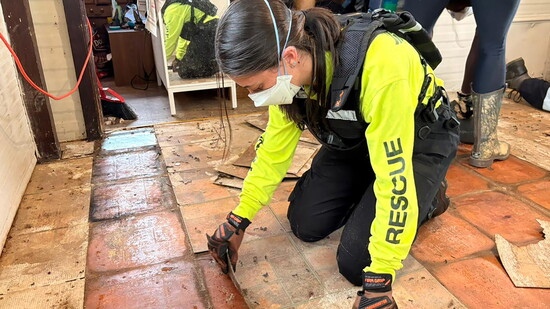When devastating floods swept through Kerr County and the Texas Hill Country on July 4, Shalom Austin leaders mobilized within hours. What began as a holiday marked by rising waters soon became a rallying point for the Jewish community across Texas and beyond.
Rabbi Daniel A. Septimus, CEO of Shalom Austin, said the urgency was clear.
“As soon as we began to learn the devastation that was going on, specifically at Camp Mystic, where some of our Dell JCC members were present, we immediately knew we needed to do something,” he said.
The response quickly grew from local concern into a national call for help. By mid-August, more than 3,200 donors across 46 states had contributed, raising nearly $850,000 for relief efforts.
Board Chair Phil Loewy recalled that Septimus reached out on July 4, even while on family vacation.
“Daniel jumped on it immediately,” Loewy said. “Our Jewish communities in Texas, unfortunately and fortunately, have had experiences with disasters. We felt that, along with partnering with other Texas federations, we were best equipped to help and get moving because of the resources we had in place.”
The campaign has emphasized both immediate needs and longer-term recovery. Matt Smith, chair of the Texas Flood Relief Campaign Allocations Task Force, explained that the group leaned on national partners to guide best practices.
“It was decided that we needed to give 15 to 20 percent of the fund out right away. That’s just a best practice in disaster relief,” Smith said. “At the time, there are so many needs, but you don’t yet know what the longer-term problems will be.”
One early recipient was CADENA, a Jewish relief organization based in Latin America, which wanted to offer its assistance to those affected. Shalom Austin’s funding allowed CADENA to remain in Texas longer, deploying teams that cleared debris while also bringing therapists to support survivors.
“During a disaster, as you can imagine, there’s a lot of mental health and trauma that goes on. We really loved supporting that type of work,” Smith said.
Mental health support has become a central pillar of Shalom Austin’s relief approach. Beyond CADENA, funds helped launch a partnership between UT Health San Antonio to support an app for Kerrville Fire, creating confidential and easy access to ongoing mental health support.
“They saw a lot while helping others and really didn’t have an outlet to speak with anyone or the funding to pay for it,” Smith said. “This was a quick decision that aligned with our values.”
Volunteers also played a crucial role. More than 50 people joined grassroots clean-up and supply drives, while an Amazon wish list drew hundreds of donations from across the country.
“We received over 400 items donated to us over the course of a couple of weeks, which is just incredible,” Septimus said. “Our volunteer director made sure whatever was being donated could be utilized.”
As relief continues, leaders acknowledge the challenges of sustaining momentum.
“The scope is enormous, and our fund cannot ever cover it all,” Smith said. “We hope that by giving out funds, it inspires other foundations to also give. This is going to be a years-long effort, and part of our job is making sure it doesn’t leave the news cycle.”
For Loewy, the effort embodies Shalom Austin’s core values.
“Two of our values are kehilla, which is community building, and tikkun olam, the commitment to making the world a better place,” she said. “In this relief effort, we came together to help those in need, and in that process, we built community.”
Septimus framed the response as part of a deeper tradition of Jewish resilience and responsibility.
“We know what it’s like to be vulnerable… we know our history and our story,” he said. “Our community continues to live out those values of helping others when we see someone who’s in need of support.”
“In this relief effort, we came together to help those in need, and in that process, we built community.”
